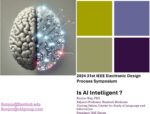Dr. Dennis Michaelis is the founder and CEO of the AI chip start-up. With a Ph.D. in Bio-Inspired Computing at the Purdue University in Indiana and a background in electrical engineering, he brings a unique blend of technical expertise and social commitment to the company. His previous role as Regional Director for Anonymous for… Read More
Artificial Intelligence
Ultra Ethernet and UALink IP solutions scale AI clusters
AI infrastructure requirements are booming. Larger AI models carry hefty training loads and inference latency requirements, driving an urgent need to scale AI acceleration clusters in data centers. Advanced GPUs and NPUs offer solutions for the computational load. However, insufficient bandwidth or latency between servers… Read More
An Invited Talk at IEDM: Intel’s Mr. Transistor Presents The Incredible Shrinking Transistor – Shattering Perceived Barriers and Forging Ahead
IEDM turned 70 last week. This was cause for much celebration in the form of special events. One such event was a special invited paper on Tuesday afternoon from Intel’s Tahir Ghani, or Mr. Transistor as he is known. Tahir has been driving innovation at Intel for a very long time. He is an eyewitness to the incredible impact of the Moore’s… Read More
IEDM Opens with a Big Picture Keynote from TSMC’s Yuh-Jier Mii
The main program for the 70th IEDM opened on Monday morning in San Francisco with an excellent keynote from Dr. Yuh-Jier Mii, Executive Vice President and Co-Chief Operating Officer at TSMC. Dr. Mii joined TSMC in 1994. Since then, he has contributed to the development and manufacturing of advanced CMOS technologies in both fab
Accellera 2024 End of Year Update
From my viewpoint, standards organizations in semiconductor design always looked like they were “sharpening the saw”: further polishing/refining what we already have but not often pushing on frontiers. Very necessary of course to stabilize and get common agreement in standards but equally always seeming to be behind the innovation… Read More
CEO Interview: GP Singh from Ambient Scientific
Gajendra Prasad Singh, also known as GP Singh, is a seasoned tech professional with over 26 years of experience in advanced semiconductor chips. With a zeal to solve the most complex technical problems, he harped on a difficult journey to create programmable AI Microprocessors, that provide high-performance in a cost-effective… Read More
PDF Solutions Hosts Executive Conference December 12 on AI’s Power to Transform Semiconductor Design and Manufacturing
PDF Solutions, Inc. will host an AI Executive Conference Thursday, December 12, in San Francisco featuring keynotes, presentations, panels and demonstrations offering insights into the power of AI to transform semiconductor design and manufacturing. The conference immediately follows the 70th Annual IEEE International… Read More
Is AI Intelligent? Insights from Ronjon Nag’s Presentation
In his keynote at the 2024 31st IEEE Electronic Design Process Symposium, Dr. Ronjon Nag, an adjunct professor at Stanford Medicine and president of the R42 Group, poses the provocative question: “Is AI Intelligent?” Drawing from four decades of pioneering work in AI, Nag blends personal anecdotes, scientific … Read More
CEO Interview: Rajesh Vashist of SiTime
Rajesh Vashist is SiTime’s Chairman and Chief Executive Officer and has served in this role since September 2007. Prior to joining SiTime, Mr. Vashist served as CEO and chairman of the board of directors of Ikanos Communications, Inc., a semiconductor and software development company, from July 1999 to October 2006. Mr. Vashist… Read More
Compiler Tuning for Simulator Speedup. Innovation in Verification
Modern simulators map logic designs into software to compile for native execution on target hardware. Can this compile step be further optimized? Paul Cunningham (GM, Verification at Cadence), Raúl Camposano (Silicon Catalyst, entrepreneur, former Synopsys CTO and now Silvaco CTO) and I continue our series on research ideas.… Read More












TSMC vs Intel Foundry vs Samsung Foundry 2026